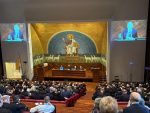Belgian liberation theologist and sociologist Francois Houtart died Tuesday at the age of 92, leaving a powerful legacy through his decades of work theorizing globaliztion, alternatives to capitalism and religion from a Marxist perspective.
Houtart died in Quito, Ecuador, where he lived and worked at the Pueblo Indio Foundation and with several universities. Houtart was born in Brussels in 1925, became a Catholic priest in 1949 completed a doctorate in sociology at the University of Louvain.
A prolific academic, Houtart became a pioneering writer on anti-capitalist thought and identified himself with the Marxist theoretical tradition. He was one of the main promoters of the World Social Forum of Porto Alegre in 2001, aimed at forging alternatives to pressing world problems, including inequality and the globalization of neoliberal economics and politics.
Houtart was part of the liberation theology movement that interprets Christianity through the lens of radical liberation from social, political and economic oppression. Over his decades-long career, he lived in several countries in Latin American in which he studied the processes of social change.
As one of his most famous phrases says, Houtart believed that humanity “must find a new paradigm of life against the paradigm of death. The paradigm of the common good of humanity.”
Along with Egyptian-French Marxist economist Samir Amin, Houtart founded the Center Tricontinental and the World Forum for Alternatives to study development from the perspective of social actors of the Global South and their defense of social, political, cultural and environmental rights.
Houtart published about 70 books, mainly on the relationship between the Catholic Church and social change, as well as alternatives to capitalism in Latin America. He was part of the international commission accompanying the peace negotiations between the FARC guerrilla army and the Colombian government, which concluded with a historic peace agreement last year after four years of talks.
Houtart had been called the “Pope of anti-globalization,” and his supporters pushed forward his candidacy for the 2011 Nobel Peace Prize, which he later cancelled after admitting to having abused a minor 40 years ago and offering an apology.
In 2009, the sociologist was awarded the UNESCO-Madanjeet Singh Prize for the Promotion of Tolerance and Non-Violence, recognizing his “lifelong commitment to world peace, intercultural dialogue, human rights and the promotion of tolerance, and in recognition of his outstanding efforts to advance the cause of social justice in the world.”
(Source: telesurtv.net)









